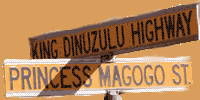Speaking in Clicks
 3:25
Larry Massett
3:25
Larry Massett
Zulu click language in embarrassing social situations.
Broadcast: Aug 29 2003 on PRI/MPR Savvy Traveler Subjects: Spoken Word, Travel, International
Clicks Saved My Butt
Larry Massett for Savvy Traveller
HOST: Even if you donŐt have a great ear for languages, French, Spanish, German and Italian have some semblances of familiarity. But what if you wanted to pick up a language without any Latin roots? There, you might be duly intimidated. Larry Massett tells us how he fared with a language in which most Americans couldnŐt even say Ňhello.Ó
I didn't learn to speak Zulu the summer I worked in South African. I did, however, pick up on those click sounds they have: you know, the (”nock”) (”nack”) (”tsk”) (”tseek”), the consonants that are so tricky for outsiders. I took it as a challenge, like learning to wiggle your ears. None of the white people I knew born and raised in Africa could do a click; but I practiced every day. It was a stunt, a little knowledge... a dangerous thing.
[music starts]
One night a Zulu friend took me to a shabeen outside of Durban. A shabeen is an unlicensed tavern -- in this case just a garage in a back yard. There was no sign; you'd never know it was there if you weren't local. No jukebox, just a radio, and no bar -- only beer and soft drinks in a cooler and a few chairs. Really it was a clubhouse for the men of the neighborhood, a place to shoot the breeze after work. They all stood when we came in, introduced themselves, and went back to talking.
Their talk was political -- in South Africa most talk is political -- and there was one man at the center of it. He was eldery, stern, professorial, and apparently a Marxist; he was explaining to everyone why Marx would be in favor of Coca-Cola plants these days. It was a learned explanation. But suddenly he stopped and turned to me.
“You.” he said. “Five minutes ago when we shook hands I told you my name. Now: What is my name?”
(Oh dear god. I can't remember names. Ever. Could I say 'sorry, I forgot”- would that be okay? Obviously not. This was a challenge.)
”Of course I remember your name, ” I heard myself say.
The room went silent. Someone shut the radio off.
[music stops]
“Of course I do --”
(Everyone's waiting.)
(let's see -- John Doe, Bob Smith, John Smith, John Robert, John John, Robert Kennedy -- no no, come on --)
“Your name of course is -- ahem”
And then it hit. His name had a click in it. I could do clicks. Bingo.
“Your name,” I said, ”is ”Nnn (tsk) Yama”.
[pause]
“I thought so.” he said. “Just as I thought. All these years the English told us they couldn't pronouce our names. So they said they'd have to call us 'Smith' or 'Robert' or something. We always knew they were lying.”
[music starts again]
For a moment I had insane idea of challenging Mr ”Nnn (tsk) Yama” to wiggle his ears. I thought better of it.
But if I ever meet the Queen of England, I am going to ask her...
INFO: Part of Hearing Voices Stories. Produced with grants from the: cpb.org Corporation for Public Broadcasting and arts.endow.gov National Endowment for the Arts.

